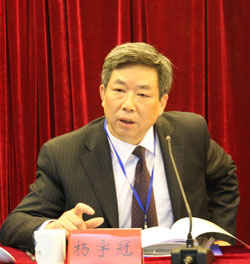Law amendment brings human rights to center stage
- By Yang Yuguan
 0 Comment(s)
0 Comment(s) Print
Print E-mail China.org.cn, March 15, 2012
E-mail China.org.cn, March 15, 2012
 |
|
Yang Yuguan is a professor of China University of Political Science and Law. |
The amendment to China's Criminal Procedure Law is a high priority during the Fifth Session of the 11th National People's Congress (NPC). The 1996 draft of the law has been revised according to China's current conditions and circumstances and international criminal justice standards. Many aspects of the Criminal Procedure Law 1996 were revised in the amendment, e.g. incorporating the clause of respecting and safeguarding of human rights, and adopting the exclusionary rule. It highlights the aim of China's Criminal Procedure Law to respect and safeguard human rights.
As Criminal Procedure Law is closely related to the rights of victims, suspects and defendants, and relevant to the protection of all persons in the society at large, the amendment has been received with great interest by both scholars and members of the public.
I have highlighted the four principle areas of discussion:
Adding the clause of "respecting and safeguarding of human rights"
The amendment has recognized the principle of respecting and safeguarding human rights enshrined in the Chinese Constitution by adding the stipulation of "respecting and safeguarding human rights". The addition provides a clear legal basis for correcting the situation in which the emphasis is placed on the punishment of criminals at the expense of protecting human rights during the judicial process.
The function of criminal procedure law should not be to punish anyone including the suspects. Rather, it should be the process of determining if the accused is innocent or guilt. It is the function of criminal law to decide on an appropriate punishment in the case of the guilty. International documents such as the Universal Declaration of Human Rights, the International Covenant on Civil and Political Rights and the Convention against Torture and Other Cruel, Inhuman or Degrading Treatment or Punishment, all have articles to protect human rights. Protecting human rights is also necessary in order to maintain social stability.
Establishing Chinese-style exclusionary rule
The amendment also added the exclusionary rule. Six new articles are related to the rule, including the exclusion of oral evidence (Article 54), the procuratorate's function in suppressing the illegally obtained evidence (Article 55), court hearing process of suppressing the evidence (Article 56), burden of proof (Article 57) and level of proof (Article 58). These contents have formed a complete system of exclusionary rule. These articles have been made on the basis of extensive theoretical researches and practice at home and abroad and in line with the United Nations' guidelines on international criminal justice.
The exclusionary rule means that evidence obtained illegally should not be used in criminal proceedings against the victim (whose lawful rights have been violated by governmental officers, i.e. the interrogators), in accordance with the context of Article 15 of the Convention against Torture.
In 2010, six departments of Chinese government, including the Supreme People's Court and the Supreme People's Procuratorate, jointly drew up the Decision of Suppressing the Illegal Evidence in Criminal Justice, which has established the exclusionary rule at the legislative level. However, implementation of the rule remains a problem, and the cases of obtaining evidence illegally still happened occasionally. Now, the exclusionary rule has been written formally into law with legal binding force.
"Privilege against self-incrimination"
The amendments of the Criminal Procedure Law clearly stipulate that "no one shall be compelled to incriminate themselves." This clause is the reflection of the "respect and safeguarding of human rights" in the criminal justice system. It also goes beyond the criminal justice system by safeguarding the rights of society as a whole.
This new clause added to the Criminal Procedure Law is an important achievement in Chinese criminal judicial reform and has great significant for the enhancement of the Criminal Procedure Law, as well as ensuring convergence with international criminal justice procedures.
Article 14 of the International Covenant on Civil and Political Rights clearly stipulates that no defendant may be compelled to testify against himself or to make a confession of guilt. China has already signed the Convention and is currently awaiting ratification of the National People's Congress. This assurance of human rights in China's Criminal Procedure Law is truly a great achievement.
Introducing the video or audio recording mechanism in the questioning of suspects
The amendments of the Criminal Procedure Law stipulate that investigators must either video or record the questioning of a criminal suspect. In cases where life imprisonment or the death penalty may be applicable, sounds recording or video recording should be used throughout the whole process.
The system for recording the questioning of suspects is another important achievement in China's criminal judicial reform process. Its implementation could protect the legitimate rights and interests of defendants. Such a recording system is also a key aspect of the exclusionary rule. Recordings can prove whether the evidence is legally obtained, therefore, preventing investigators from using illegal means to get oral confession. They can also be presented as proof at trial.
(This article was first published in Chinese and translated by An Wei and Lu Na.)
Opinion articles reflect the views of their authors, not necessarily those of China.org.cn.






Go to Forum >>0 Comment(s)